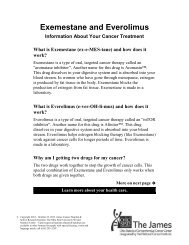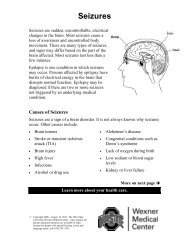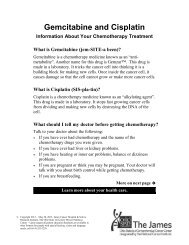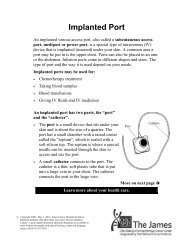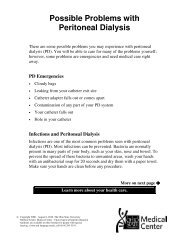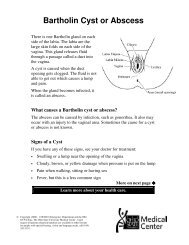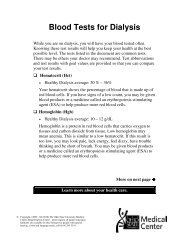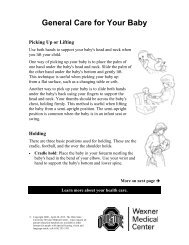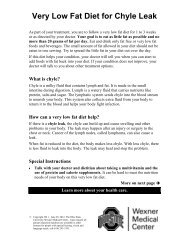Herpes Simplex Virus - Patient Education Home
Herpes Simplex Virus - Patient Education Home
Herpes Simplex Virus - Patient Education Home
You also want an ePaper? Increase the reach of your titles
YUMPU automatically turns print PDFs into web optimized ePapers that Google loves.
Page 2<br />
Testing and Treatment<br />
Your doctor or health care provider will give you a physical exam and ask<br />
about your health and sexual history. Tell your doctor when your signs started.<br />
Blood tests or a sample of the fluid in a blister may be sent to the lab to check<br />
if you have herpes.<br />
<strong>Herpes</strong> is a chronic infection. Your doctor will treat signs of infection. There<br />
is no cure for the virus. Medicines can be used to treat the pain from blisters<br />
and to shorten the time you have the blisters. Medicines may also be used to<br />
prevent new blisters from forming.<br />
<strong>Herpes</strong> infection has been known to cause cervical cancer in women. Talk<br />
with your gynecologist if you are diagnosed with herpes.<br />
Self Care<br />
To reduce the discomfort and spread of genital herpes:<br />
• Wash your hands with soap and water before and after touching blisters.<br />
• Keep the genital areas clean and dry.<br />
• If it is painful to urinate, soak in a tub of warm water to relieve pain or try<br />
warm cloth compresses to reduce irritation.<br />
• Some people find relief with ice packs. Always follow your doctor’s<br />
instructions for how long to use the ice pack.<br />
• Use mild soaps.<br />
• Wear loose fitting clothing. Do not wear panty hose or tight fitting jeans.<br />
• Wear cotton underwear.<br />
• Avoid touching the eyes after touching blisters. <strong>Herpes</strong> can spread to the<br />
eyes and cause serious infection, and in rare cases, blindness.<br />
• Avoid reoccurring blisters. Stress, lack of sleep, and other infections can<br />
increase blisters. Healthy lifestyle behaviors can reduce the number and<br />
severity of blisters.<br />
Protecting Your Partner<br />
<strong>Herpes</strong> can spread to a partner when no signs are present. A partner can be<br />
infected at any time. Protect your partner by:<br />
• Using a condom during sexual intercourse. Use of a spermicide may help<br />
too.



